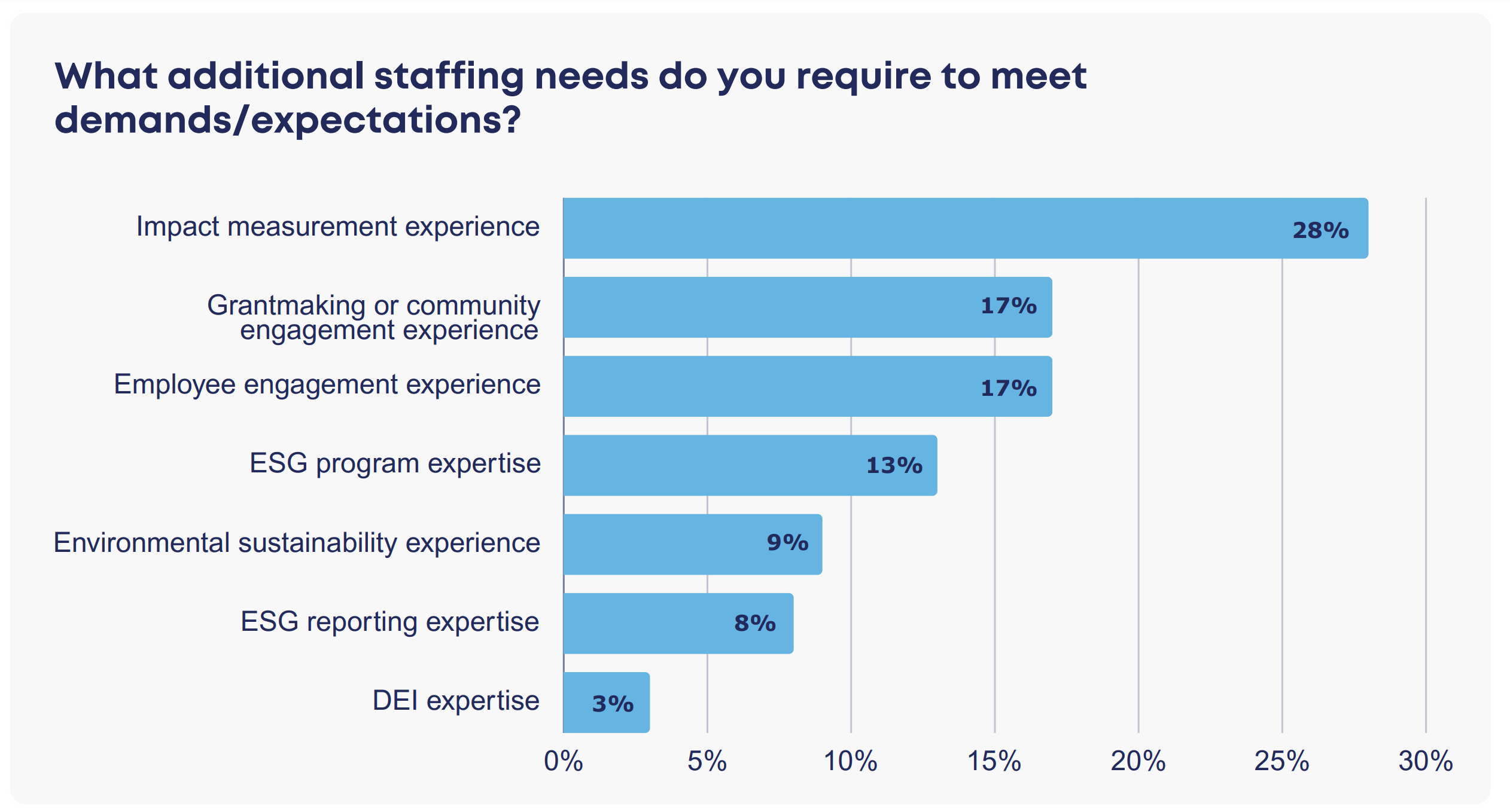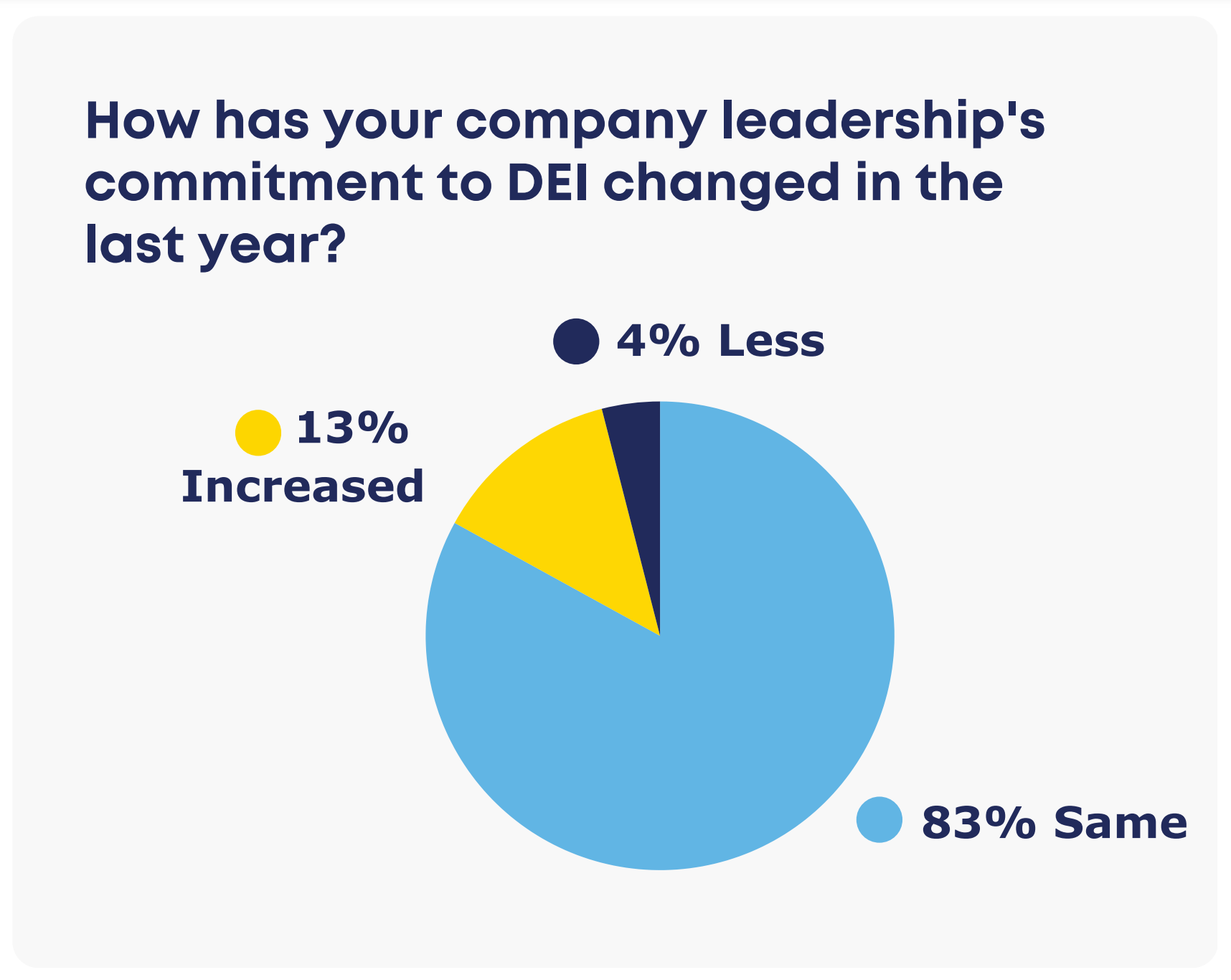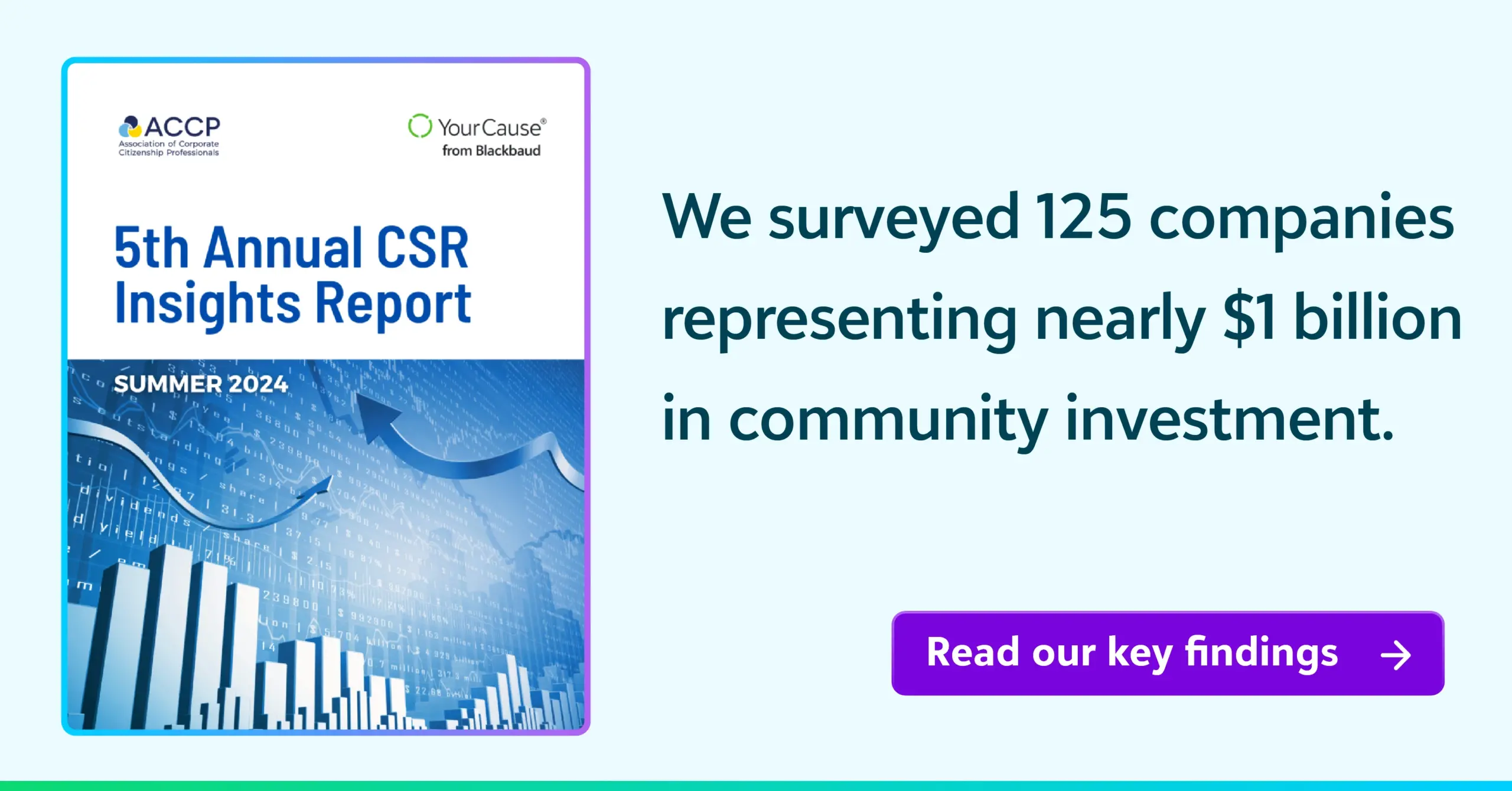Identifying Trends From the 5th Annual CSR Survey
The 5th Annual CSR Insights Survey from the Association of Corporate Citizenship Professionals (ACCP) and YourCause from Blackbaud aims to identify the evolving trends and challenges faced by professionals in the dynamic social impact landscape. This survey, recently featured in a USA today article, was conducted in April 2024 and collected responses from 125 leading companies, representing nearly $1 billion in community investment.
Below, we explore some of the key findings from this report, covering the growing significance of employee volunteerism, the increasing demand for impact measurement, a desire for more innovative technology, as well as developments in the state of DEI, both in terms of corporate commitments and within CSR teams and leadership.
Employee Volunteering Takes the Spotlight
One highlight from the survey is the increased prominence of employee volunteering. Specifically on volunteering engagement, 77% of respondents reported higher participation in volunteerism overall, up from 61% in 2023. This strongly corroborates with our findings in the YourCause 12th Annual CSR Industry Report, which also pointed to an overall rise in volunteering engagement rates, as well as a continued shift back to more in-person volunteering.

An overwhelming 88% of those surveyed reported that their budgets for employee engagement have either grown or stayed the same this year, marking a notable increase from 70% in 2023. Additionally, 33% of the survey participants said that they have introduced or enhanced volunteer-related incentives this year. These findings suggest that companies are likely looking to leverage the powerful connection between engagement and wellbeing, as well as cater to employee preferences, by incentivizing community engagement and offering more diverse volunteer options.
There was also an uptick in the expectations from employees to participate in making CSR decisions in their companies, as reported by 22% of respondents, compared to 18% in 2023. Employees are clearly keen to contribute to society by working in socially conscious corporations, which aligns with the growing evidence for volunteerism and corporate social impact as an effective strategy for driving employee recruitment and retention.
Increased Expectations for CSR teams, Especially on Impact Measurement
Another major takeaway was the rise in demand to measure impact, which 71% of respondents experienced, compared to 53% in 2023. While businesses recognize the critical role of CSR, the fluctuating economic landscape means that there is also a consistent view on the bottom line and the quantifiable outcomes and impact of these initiatives. This is bolstered by the fact that 50% of participants reported an increased exposure to the C-suite regarding CSR, ESG, and DEI efforts.
In turn, this pressure on CSR and ESG teams to provide more of data-driven business case means that there is greater need for more headcount (58%), more financial resources to invest in community (41%), more financial resources for employee engagement (40%), and improved technology (30%). In terms of staffing needs, at the top of the list was the requirement for professionals with impact measurement experience.

Despite 73% of CSR teams facing increased responsibilities, the survey did signal some relief, relative to last year, on the impact this has had on team members. For example, while 61% of CSR professionals were working longer hours and 50% were facing burnout in 2023, these numbers have gone down to 24% and 33% respectively. Similarly, only 2% reported mental health challenges due to the higher workload (down from 19% last year). While this movement is in a positive direction, the survey data shows that practitioners are still in need of more support and resources to meet rising expectations and responsibilities.
Leveraging Innovative Technology to Drive Efficiency
A crucial element that is increasingly identified as necessary in implementing and demonstrating the value of corporate social impact is innovative technology. In fact, 30% of respondents say they need improved technology to meet their teams’ demands — a figure that has doubled from 15% in the previous year.

A quarter of the surveyed professionals have embraced new technological solutions, and an additional 19% are planning or discussing such advancements. Reflective of the higher expectations around impact measurement, 14% have directed investments towards specialized technology for ESG reporting.
In terms of specific innovation, CSR professionals are more open than ever towards integrating Artificial Intelligence (AI) into their processes, recognizing its substantial potential to elevate their work. The primary benefits of AI adoption are enhanced data analysis and aggregation, reported by 49% of participants, and improved communications and storytelling, as indicated by 36%. As companies embrace the exciting possibilities of harnessing AI, it is important to keep a focus on responsible use and managing associated concerns such as ethical decision-making, along with the risk of bias and discrimination.
Interested in a responsible, AI-powered, impact reporting and storytelling solution for social impact teams of all sizes? Learn about the newest offering from our Corporate Impact solutions, Blackbaud Impact Edge™.
The State of Diversity, Equity, and Inclusion
In the past year, there has been a lot of charged conversation around DEI in the political, legal, and media landscape. About a third of survey respondents have faced heightened oversight or legal scrutiny of their DEI-related initiatives. Moreover, 31% have observed changes in their company’s language regarding DEI, and 17% have reduced external communications on the topic.
However, commitment to DEI from senior leadership within companies remains steadfast at 96%, with 83% of participants noting this commitment has remained consistent, and 13% even reporting an increase compared to last year. It appears that while organizations are taking steps to review risks, there is still a very high level of commitment to advancing DEI initiatives.
In relation to the internal structures of CSR departments, 22% of participants indicated an increased integration in DEI initiatives, and 18% highlighted higher involvement for Employee Resource Groups (ERGs). Review why DEI matters to your workplace culture and learn how to leverage ERGs to invest in diversity, drive engagement, and reduce turnover with our Roadmap to Investing in DEI through Employee Resource Groups.

There were also developments in the state of diversity and representation within CSR teams highlighted in the survey report. The percentage of respondents reporting that their teams had little or no BIPOC staff has declined to 46% from 50% last year and 61% in 2021. In 2024, 68% of participants also indicated their team leader is white, compared to 80% last year. While these are signs of gradual improvements in the diversity of corporate impact professionals, there are still strides to make in this front.
This survey’s findings provide valuable insights into the challenges and opportunities in the social impact landscape. The increasing responsibilities, resource limitations, shifting priorities, and diversity considerations underscore the need for adaptability, flexibility, and strong leadership commitment.
Click below to download the full report and findings.
